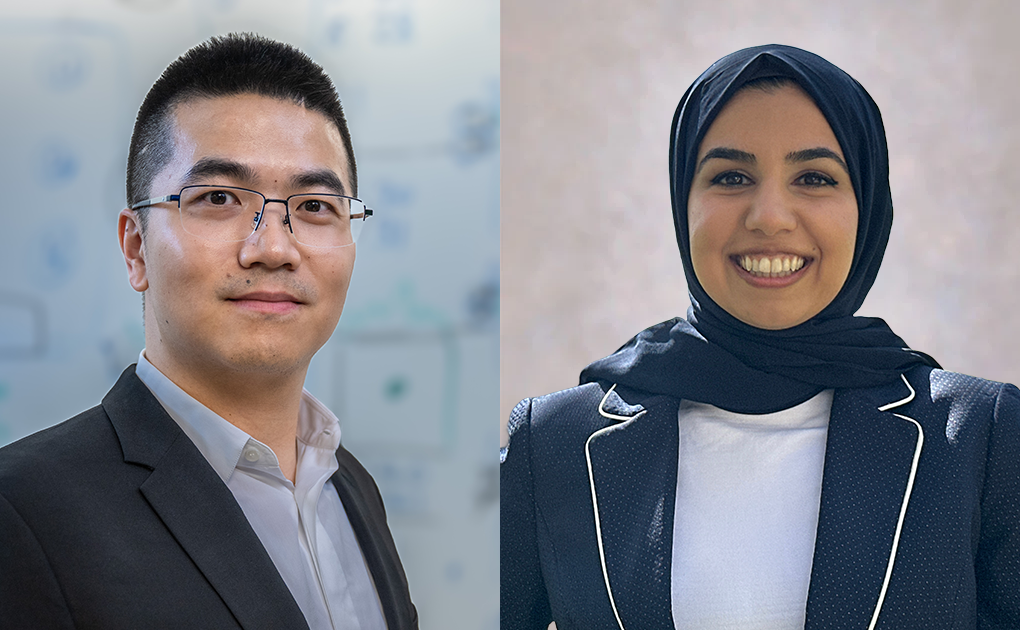Early Career Investigator Awards
Save the Date: Celebration of Research
The Early Career Investigator Award (ECIA) and Industry-Sponsored Researcher Award (ISRA) distinguished faculty awardees will be honored at the upcoming Celebration of Research taking place Thursday, April 16, 2026 from 2 p.m. to 4:30 p.m. in the Ballroom of the Diaz Compean Student Union. This annual event also highlights the outstanding accomplishments of faculty and student researchers across campus.
Registration will open in early spring.
Reward and Recognition
The award recipient will receive a commemorative trophy, a cash award of $5,000, and a Certificate of Special Congressional Recognition. The award will be presented at the Celebration of Research on on Thursday, April 16, 2025. A profile of each recipient’s accomplishments will be announced to faculty and staff via email, and featured on the Research Foundation’s website and in the Research Foundation’s Annual Report. This information may also be publicized in university media.
2024 Awardee
Please join us in congratulating the 2024 San José State University Research Foundation (SJSURF) Early Career Investigator Award (ECIA) and the Industry-Sponsored Researcher Award (ISRA) recipients.

Drs. Gaojian Huang (left) and Saugher Nojan (right)
Dr. Gaojian Huang
Assistant Professor, Department of Industrial and Systems Engineering
Charles W. Davidson College of Engineering
Dr. Gaojian Huang joined the Department of Industrial and Systems Engineering in August 2021. His research focuses on human-centered AI, designing adaptive systems that improve the accessibility and safety of technologies such as intelligent mobility platforms and self-driving vehicles. Since joining SJSU, Dr. Huang has published 14 journal articles, 32 conference papers, and brought in $467,200 in research funding from agencies such as the National Science Foundation, National Institutes of Health, U.S. Department of Transportation, and Honda Research Institute USA. As the director of the Behavior, Accessibility, and Technology (BAT) Lab, he leads projects that develop AI-powered adaptive interfaces and cognitive state monitoring tools, with the goal of improving real-time human-machine interaction. Dr. Huang’s research program is deeply student-centered — his mentees have gone on to doctorate programs at top-tier institutions and industry positions at companies like Tesla, Amazon, and Honda. Their achievements include campus-wide fellowships, top CSU research honors, and national conference presentations. Dr. Huang’s work exemplifies the power of inclusive research design and the transformative role of mentorship in advancing both scholarship and student success.
Dr. Saugher Nojan
Assistant Professor, Department of Sociology and Interdisciplinary Social Sciences
College of Social Sciences
Since joining San José State University in Fall 2021, Dr. Saugher Nojan has emerged as a rising research leader with a growing national reputation. Her interdisciplinary work examines complex social questions through a community-centered lens, and she has secured over $300,000 in competitive external research funding from the National Endowment for the Humanities, the American Council of Learned Societies, and the Mozilla Foundation. Dr. Nojan has published seven peer-reviewed journal articles — five of which were completed at SJSU — and her work continues to gain visibility across scholarly networks. Her research program doubles as a robust student training ground, offering hands-on research opportunities that enhance academic development and professional readiness for both undergraduate and graduate students. Through collaborative inquiry and the real-world application of her findings, Dr. Nojan advances scholarship that benefits students and communities alike. Her growing portfolio of publications and successful grant activity reflects a deep commitment to impactful, engaged research.
Past ECIA Awardees
Congratulations to all of our previous recipients.
Awardees Since 2005
2023
Hilary M. Hurst
Department of Physics and Astronomy
College of Science
Melissa Beresford
Department of Anthropology
College of Social Sciences
2022
Dahyun Oh
Department of Chemical and Materials Engineering
Charles W. Davidson College of Engineering
Tammie Visintainer
Science Education Program
College of Science, and
Department of Teacher Education
Connie L. Lurie College of Education
2021
Madalyn Radlauer
Department of Chemistry
College of Science
Rhonda Holberton
Department of Digital Media Art
College of Humanities and the Arts
2020
Ellen Middaugh
Child and Adolescent Development
Connie L. Lurie College of Education
Thomas Madura
Department of Physics & Astronomy,
College of Science
2019
Kimberly Blisniuk
Department of Geology
College of Science
Yue "Wilson" Yuan
Department of Justice Studies
College of Health and Human Sciences
2018
Minghui Diao
Department of Meteorology and Climate Science
College of Science
Susan Snycerski
Department of Psychology
College of Social Sciences
2017
Ehsan Khatami
Department of Physics and Astronomy
College of Science
David Schuster
Department of Psychology
College of Social Sciences
2016
Rachel French
Department of Biological Sciences, College of Science
Miranda Worthen
Department of Health Sciences & Recreation
College of Applied Sciences & Arts
2015
Aaron Romanowsky
Department of Physics & Astronomy
College of Science
Virginia San Fratello
Department of Design
College of Humanities & the Arts
2014
Scott Hamilton
Moss Landing Marine Labs
College of Science
Matthew Holian
Department of Economics
College of Social Sciences
2013
Camille Johnson
Department of Organization & Management
College of Business
Juneseok Lee
Department of Civil & Environmental Engineering
College of Engineering
2012
Lionel Cheruzel
Department of Chemistry
College of Science
Lili Luo
School of Library & Information Science
College of Applied Sciences and Arts
2011
Ivano Aiello
Moss Landing Marine Labs
College of Science
Marjorie Freedman
Department of Nutrition, Food Science & Packaging
College of Applied Sciences and Arts
2010
Craig Clements
Department of Meteorology and Climate Science
College of Science
Amy D’Andrade
School of Social Work
College of Applied Sciences and Arts
2009
Susan Lambrecht
Department of Biological Sciences
College of Science
Danelle Moon
Director of Special Collections and Archives
University Library
2008
Daryl Eggers
Department of Chemistry
College of Science
2007
Sadhna Diwan
School of Social Work
College of Applied Sciences and Arts
Gilles Muller
Department of Chemistry
College of Science
2006
John Clapp
Animation/Illustration Department
School of Art & Design
John Lee
Mechanical & Aerospace Engineering Department
College of Engineering
2005
Michael Graham
Moss Landing Marine Labs
College of Science
Jennifer Madigan
Department of Special Education
College of Education